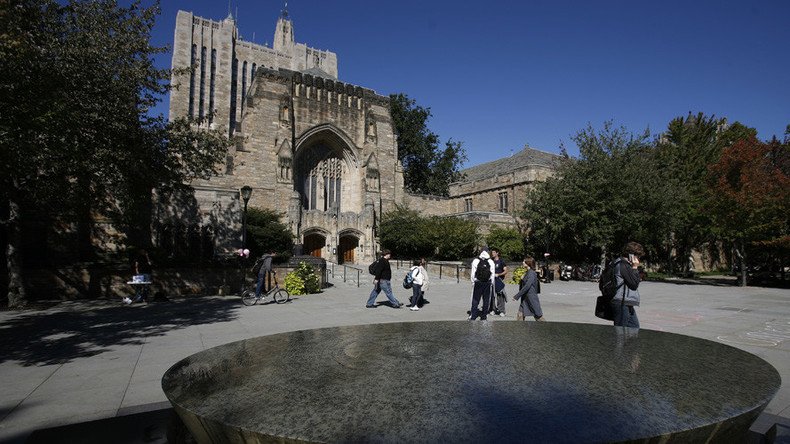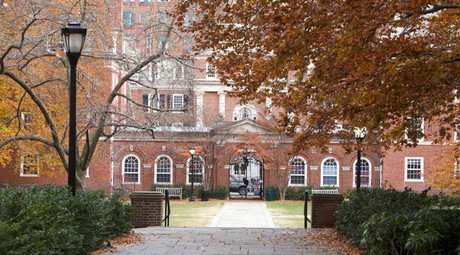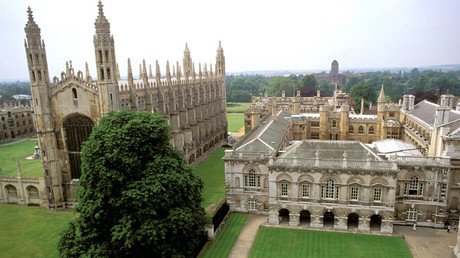Yale sidelines English poets after complaints of ‘colonialism’

Students at Yale University can now enroll in two revised English literature courses after a petition was circulated for 18 months calling to “decolonize the English department.” Students had complained the focus on white male poets was “actively harmful.”
To meet their three prerequisites in English, students at the Ivy League school can now choose from four different courses: Readings in English Poetry 1, Readings in English Poetry 2, Readings in American Literature, and the newly created Readings in Comparative World English Literature.
Chaucer and Shakespeare are studied in English Poetry 1, which means a student could graduate from Yale’s English program without having read either of those authors. The change was brought about due to a petition that has circulated over the last 18 months, complaining about the courses.
“A year spent around a seminar table where the literary contributions of women, people of color, and queer folk are absent actively harms all students, regardless of their identity,” said the petition, circulated by a student who wanted to remain anonymous, according to the Yale Daily News.
“The Major English Poets sequence creates a culture that is especially hostile to students of color. When students are made to feel so alienated that they get up and leave the room, or get up and leave the major, something is wrong,” the petition went on.
You can now achieve an English degree at @Yale without ever reading any Shakespeare.https://t.co/6g8VaflyvF
— PragerU (@prageru) October 27, 2017
The Major English Poets included classes on Geoffrey Chaucer, who wrote ‘The Canterbury Tales’ in the 1300s, as well as the 15th century playwright William Shakespeare, who wrote 38 plays and 154 sonnets. Shakespeare’s plays have been translated into every major living language and performed more often than those of any other playwright.
The metaphysical poet and social critic John Donne, who wrote sonnets, love poems, religious poems, elegies, satires and sermons in the 1600s, also found himself a target of criticism. So did the 16th century poet John Milton (‘Paradise Lost’), and 20th century poet and playwright T.S. Eliot (‘The Waste Land,’ ‘The Hollow Men’), whose works had a deep influence on other 20th century poets.
Harold Bloom, the Sterling Professor of the Humanities at Yale who teaches undergraduate courses in Shakespeare and the Art of Reading a Poem, has been highly critical of the revisionist curriculum campaigns for more than three decades.
“I am too weary to comment again on this nonsense,” Bloom, who wrote ‘The Western Canon: The Books and School of the Ages,’ told the Daily Beast when asked about the latest student protest.
The petition asked the English Department faculty to reevaluate the undergraduate curriculum and the current core requirements and introductory courses, in particular the ‘Major English Poets’ as a prerequisite for the major. The petition called for the abolishing of the course and for the pre-1800/1900 requirements to refocus and include literature relating to gender, race and sexuality.
“It’s time for the English major to decolonize ‒ not diversify ‒ its course offerings,” the petition added. “A 21st century education is a diverse education: we write to you today inspired by student activism across the university, and to make sure that you know that the English department is not immune from the collective call to action.”
Jill Richards, assistant English professor and Associate Director of Undergraduate Students, said prior students had raised similar complaints and she applauded the university’s response to revising the curriculum.
“I think it’s time to revisit our understanding of what is foundational to an English major,” Richards said.
She told the Daily Beast she would include 17 century British playwright and poet Aphra Behn, the first published African-American poet Phillis Wheatley, Victorian poet Christina Rossetti, Gertrude Stein, Langston Hughes and Derek Walcott.
Yale’s introductory courses are designed to give prospective English majors a set of skills to use in higher-level major courses, “an introduction to the abiding formal and thematic concerns of the literary tradition.”
Margaret Shultz, who majored in English, told the Yale Daily News that she supported the request to abolish the Major English Poets sequence. She added that there are many great courses in the department related to race, gender and sexuality, but they are mainly upper-level courses that are not emphasized as the “core curriculum.”
Another student, a recent graduate in English, said the department was not her “intellectual home.”
“In my four years as an English major, I primarily was lectured by old, white men about rape, about violence, about death, about colonialism, about genocide, and I was repeatedly told by many of my professors that these evils were necessary or even related to spiritual enrichment. This was horrifying,” Adriana Miele told the Yale Daily News.
Katy Waldman, a recent graduate of Yale’s English program, praised the petition’s commitment to inclusivity but said the traditional cannon is an essential area of study.
“If you want to become well-versed in English literature, you’re going to have to hold your nose and read a lot of white male poets. Like, a lot. More than eight." Waldman wrote in Slate last year. “The canon is what it is, and anyone who wishes to understand how it continues to flow forward needs to learn to swim around in it. There is a clear line to Terrance Hayes (and Frank and Claire Underwood, and Lyon Dynasty) from Shakespeare...These guys are the heavies, the chord progressions upon which the rest of us continue to improvise, and we’d be somewhere else entirely without them.”
Waldman added “I want to gently push back, too, against the idea that the major English poets have nothing to say to students who aren’t straight, male, and white. For all the ways in which their particular identities shaped their work, these writers tried to represent the entire human condition, not just their clan.”
Professor David Bromwich, who taught the Major Poets course 13 times during his 28-year tenure, defended the curriculum as it stands.
“In my experience, graduates of English major commonly cite it as their favorite course,” Bromwich said.
Yale’s English Department has already moved to become more inclusive and recognizes the field can no longer just be Euro-centric, English and African American Studies Professor Jacqueline Goldsby told the student newspaper in March. In April, the department announced the arrival of African American poet Claudia Rankine, who said she would be teaching a course on “whiteness.”
Students must take 14 related courses to complete the English major.














